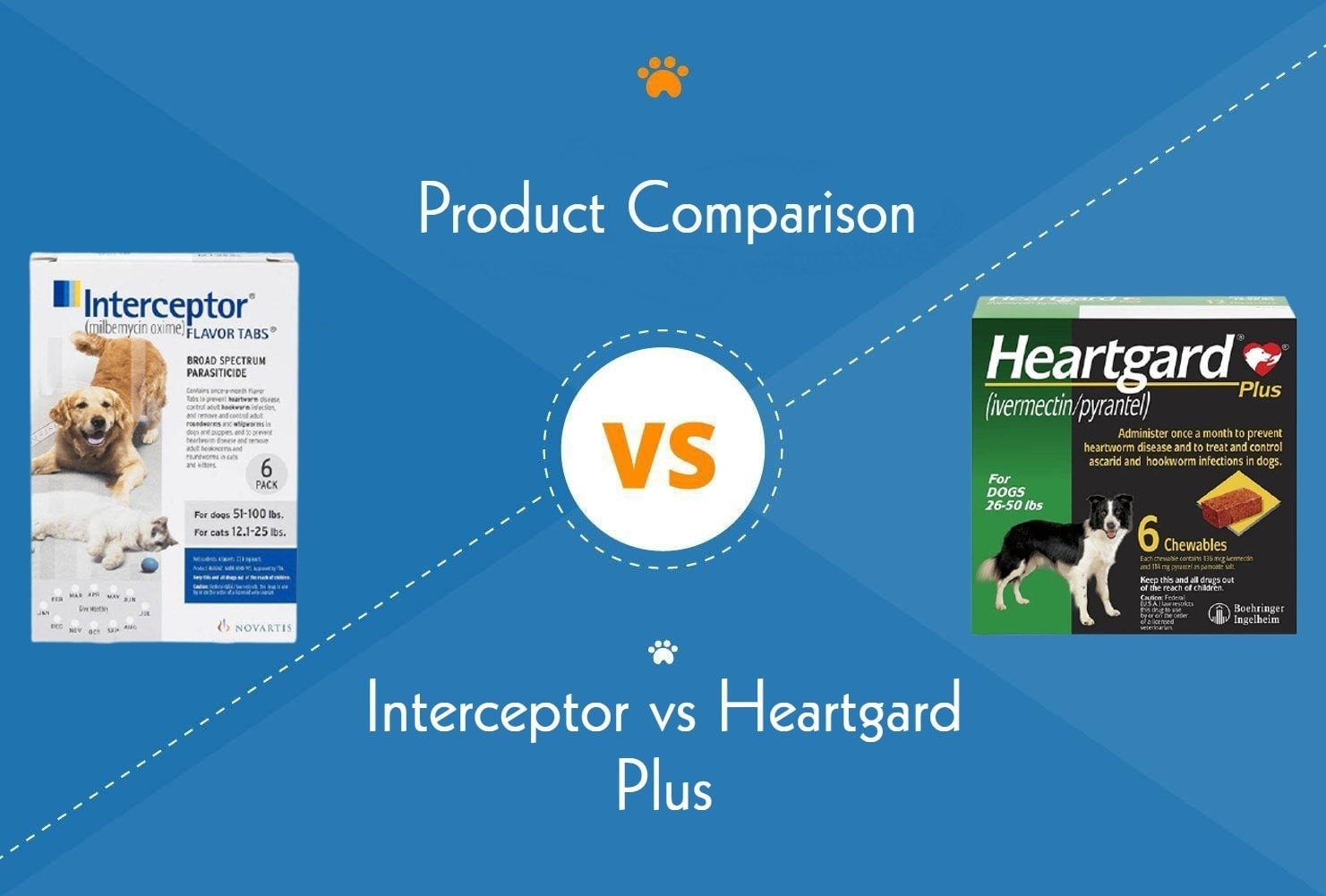Interceptor vs Heartgard Plus For Dogs: Key Differences (Vet Answer)

Updated on

Interceptor1 and Heartgard Plus 2 are two of the most popular brands for heartworm prevention, but is one a better choice?
Both are flavored tablets that, when given every month, are proven to prevent heartworm infections by killing the young worms before they reach the heart. There have been some confirmed cases of heartworms that are resistant to both treatments, but thankfully at present these seem to be very rare.
The two tablets have different active ingredients – Interceptor contains milbemycin oxime, whereas Heartgard Plus contains ivermectin and pyrantel. In addition to heartworm, both products will also kill roundworms and hookworms. Interceptor will kill whipworms, too.
At a Glance
- Contains milbemycin oxime.
- FDA-Approved for heartworm prevention.
- Must be given every month to be effective.
- Also treat for roundworms, hookworms and whipworms.
- Resistant infections are possible but rare
- Contains ivermectin and pyrantel.
- FDA-Approved for heartworm prevention.
- Must be given every month to be effective.
- Also treat for roundworms and hookworms.
- Resistant infections are possible, but rare.
Overview of Interceptor
Interceptor is a medication prescribed by veterinarians to prevent heartworm.
Heartworm is a serious parasite that dogs can catch from mosquito bites, which can lead to heart failure and death. Unfortunately, heartworm is difficult and expensive to treat once dogs have become infected for a while.
The best way to protect dogs from heartworm disease is to kill the young worms before they reach the heart. Not all dog wormers will kill heartworms, but Interceptor is one of the ones that can.
What is the active ingredient in Interceptor?
Interceptor contains Milbemycin Oxime. It is part of the family of drugs called Macrocyclic Lactones, which are effective at killing young heartworms to prevent them from reaching the heart. It will also treat hookworm, roundworm, and whipworm.
How often do I have to give Interceptor?
Interceptor must be given once a month, all year round. This will kill any young worms before they can make their way to your dog’s heart. Missing even one month of treatment may be enough to allow your dog to become infected.
Are there any dogs who cannot have Interceptor?
Puppies must be over 4 weeks old, and weigh over 2lbs (1kg), to be treated with Interceptor.
Dogs over the age of 7 months should have a blood test before they start their treatment with Interceptor to check that they are not already infected with heartworm.
There are no known issues with Interceptor in any particular breed of dog.
Can heartworms be resistant to Interceptor?
Unfortunately, some heartworms are now resistant to macrocyclic lactones such as Interceptor. However, there is no evidence that worms are more or less likely to be resistant to Interceptor when compared to other brands.
The risk of your dog developing a resistant infection is very low, and heartworm is a serious disease, so this is not a reason to stop giving your dog their medication.
All dogs at risk of heartworm should have annual blood tests to check for an infection, even if they are receiving preventative treatment.
How Much Does Interceptor Cost?
The price of Interceptor varies by region, so you will have to ask your veterinarian or pharmacy for a price. However, the cost is usually similar to that for other monthly heartworm preventatives, including Heartgard Plus.
Where can I buy Interceptor?
Interceptor is a prescription-only medication. You can either buy it directly from your veterinarian, or from a pharmacy with a prescription.
Do not buy Interceptor from anywhere that offers to sell it to you without a prescription, as you may not be getting a safe or effective product.
- Effective at preventing heartworm
- Also at treats whipworm, roundworm, and hookworm.
- Must be given every month to be effective
- Does not treat tapeworm
Overview of Heartgard Plus
Heartgard Plus is another of the medications that veterinarians can prescribe to prevent heartworm. Dogs catch heartworm from mosquito bites, but Heartgard Plus works by killing the young worms before they can reach the heart.
What are the active ingredients in Heartgard Plus?
Heartgard Plus contains ivermectin and pyrantel. Ivermectin is part of the family of drugs called Macrocyclic Lactones, which are effective at killing young heartworms. Pyrantel will treat roundworms and hookworms.
How often do I have to give Heartgard Plus?
Heartgard Plus must be given once a month to protect your dog. You need to give it all year round – even one missed monthly treatment can be enough for your dog to develop an infection.
Are there any dogs who cannot have Heartgard Plus?
Puppies must at least 6 weeks old before they can be given Heartgard Plus.
It is important to make sure that dogs are free of heartworm before starting on a preventative medication like Heartgard Plus. Dogs over 7 months old who have not previously been on heartworm medication should have a blood test before starting Heartgard Plus.
Some owners may be concerned about giving ivermectin (an ingredient in Heartgard Plus) to Collies. This is because of a genetic mutation called MDR-1, which affects how sensitive dogs are to some medications. This mutation is usually rare but is much more common amongst Collie breeds, including Border Collies, Australian Sheepdogs, and Shelties.
At high doses, ivermectin is toxic to dogs with the MDR-1 mutation. However, the dose in Heartgard Plus is low, and it has been shown that this is safe to give to collies who have this mutation.
Can heartworms be resistant to Heartgard Plus?
It is possible for dogs to get heartworm infections that are resistant to Heartgard Plus, though thankfully this seems to be very rare. There is no evidence that worms are more likely to be resistant to Heartgard Plus than to any of the other heartworm preventatives currently available.
Thankfully these resistant infections are rare, so you should continue to give your dog a monthly preventative treatment. However, it is also advisable to give your dog a blood test once a year to check that no heartworms have avoided the preventative and grown into adults.

How Much Does Heartgard Plus Cost?
Different retailers may price products in different ways, so you will have to ask your veterinarian or pharmacy. However, the cost is usually similar to that for other monthly heartworm preventatives, including Interceptor.
Where can I buy Heartgard Plus?
Heartgard Plus can only be bought on prescription. This means you can either buy it directly from your veterinarian, or from a pharmacy with a prescription.
Never buy Heartgard Plus from anywhere that offers to sell it without a prescription, as you cannot be sure it will be safe or effective. You shouldn’t use Heartgard Plus from a friend or neighbor, and you shouldn’t use it past its sell-by date.
- Effective at preventing heartworm
- Also treats roundworm and hookworm
- Must be given every month to be effective
- Does not treat whipworm or tapeworm
 What the Users Say
What the Users Say
To save you time, we’ve had a look round to see what other customers think of Heartgard Plus and Interceptor, both from reviews and pet forums!
Both products score highly on palatability. Many customers say that their dogs love the tasty tablets and will take them as treats – no need to hide in food! There is some special praise for Heartgard Plus’ chewy texture – a few dogs who dislike hard tablets seem to prefer it.
Customers also seem to find both products effective – many have used these tablets for years, and their dogs have stayed heartworm-free! There are occasional reports of dogs getting heartworm whilst taking these medications, but we do know that there are rare cases that are resistant to medications – both Interceptor and Heartgard Plus can be affected. Infections can also happen if the medication is not given on time every month, even if the dose is just a day or two late.
Several reviewers also praise the fact that both tablets cover dogs for intestinal worms, though some are annoyed that Heartgard Plus does not cover for whipworm, where Interceptor does.
There are a few mentions of dogs getting an upset stomach (vomiting and/or diarrhea) after using either Interceptor or Heartgard Plus. However, many people whose dogs could not tolerate one found that the other suited them much better!
Conclusion
Both Interceptor and Heartgard Plus are FDA-Approved to prevent heartworm, and reviews agree that they are both very effective products. Heartgard Plus may have a slight edge with fussy dogs, but Interceptor provides protection against whipworm infections, whereas Heartgard Plus does not. Neither of them will treat for tapeworms, or offer any protection against fleas, mites, or ticks, so they should both be used alongside other products as part of a thorough parasite prevention plan.
Overall, both Interceptor and Heartgard Plus are good choices to protect your dog against the nasty disease that is heartworm.
See also:







 What the Users Say
What the Users Say










